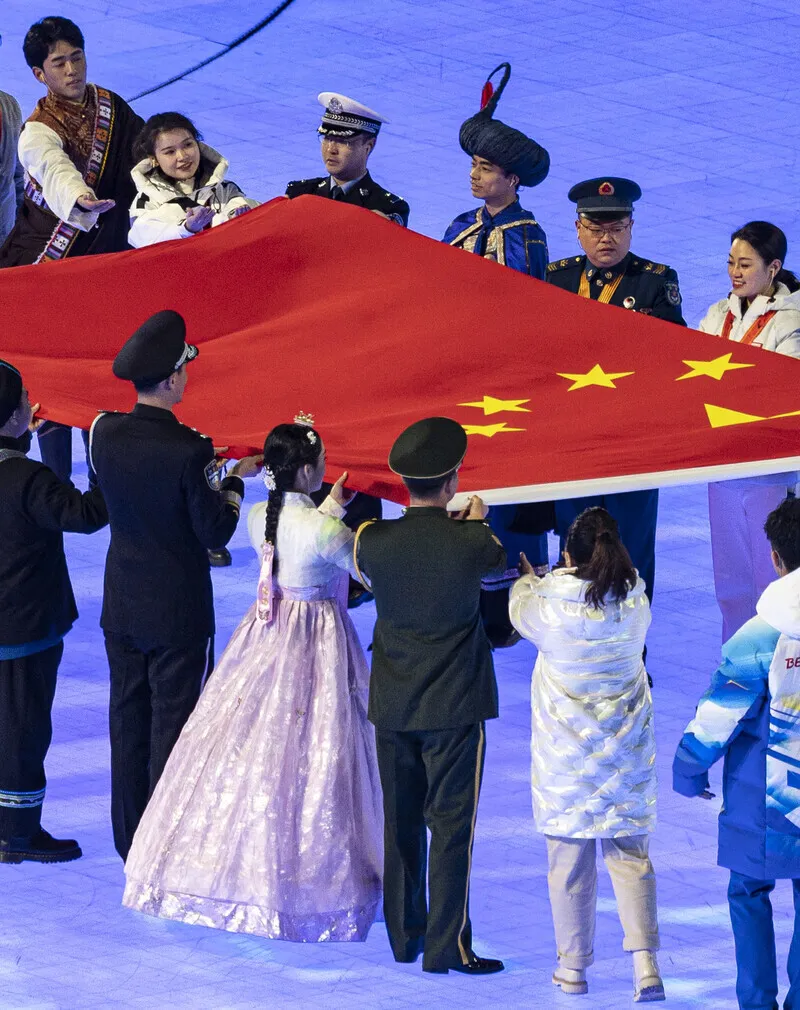hankyoreh
Links to other country sites 다른 나라 사이트 링크
S. Korean presidential hopefuls exploit hanbok controversy for political points

South Korean presidential candidates from both sides of the aisle issued scathing statements after a woman dressed in a traditional Korean hanbok outfit appeared at the opening ceremony of the 2022 Beijing Winter Olympics, sparking controversy about whether the host country was trying to claim the hanbok as its own cultural heritage.
Many are criticizing the nominees for putting out provocative statements capitalizing on anti-Chinese sentiment only a month out from the election — regardless of the popular grievances against China in South Korea that have accumulated over the years following China’s historical distortions, such as its insistence that kimchi originated in China.
Democratic Party candidate Lee Jae-myung said to reporters on Saturday, “China is carrying out policies that are hard to understand as necessary for a great country,” adding that “the Chinese government should clarify whether it’s using a period of festivities for its cultural project.”
He continued, “From discussions about kimchi, hanbok, to even where certain international celebrities are from, [China’s] cultural project is seriously damaging the pride of the Korean people.”
People Power Party nominee Yoon Suk-yeol also met with reporters on Saturday, and said, “Goguryeo and Balhae are part of the proud and brilliant history of Korea [. . .] They are not part of another’s history.”
Minor opposition People’s Party candidate Ahn Cheol-soo joined the anti-Chinese bandwagon as well, writing on his Facebook page, “To the Chinese authorities, I say: it’s hanbok, not hanfu.”
Critics called these responses irresponsible, coming from candidates who hope to be elected to the top elected office in the nation.
Ha Nam-suk, a professor of Chinese language and culture at the University of Seoul, noted during a phone call with the Hankyoreh on Sunday, “It’s understandable that grievances against China that escalated due to the country’s ‘THAAD retaliation’ exploded with the added fuel of the ‘hanbok controversy.’”
“However, politicians dreaming of becoming a country’s president should not rashly get on a bandwagon of hate simply to win votes, without considerations for sensitive diplomatic matters,” she continued.
Meanwhile, the progressive Justice Party offered the lone voice of dissent, suggesting that people “see the matter from the perspective of Koreans in China.”
Kang Min-jin, head of the Justice Party’s youth division, wrote on her Facebook page, “There are undeniably Korean compatriots who live in Chinese territory with Chinese nationality. Hanbok belongs not just to Koreans in Korea but also to Koreans abroad” — though she prefaced her statement by saying that “China must put a stop to its historical distortions and insistence on [Chinese] cultural supremacy with assertions in the vein of ‘hanbok originated from hanfu.’”
She added, “Politicians should stop stoking the controversy surrounding foreigners’ use of the national health insurance service, which has stirred up hate against Korean Chinese people. A more urgent matter for presidential nominees is dismantling institutional discrimination against immigrants and coming up with ways to treat them as equal citizens.”
By Choi Ha-yan and Lee Ju-hyeon, staff reporters
Please direct questions or comments to [english@hani.co.kr]

Editorial・opinion
![[Correspondent’s column] Coupang’s game in Washington follows familiar pattern [Correspondent’s column] Coupang’s game in Washington follows familiar pattern](https://flexible.img.hani.co.kr/flexible/normal/500/300/imgdb/original/2025/1226/8217667391873536.jpg) [Correspondent’s column] Coupang’s game in Washington follows familiar pattern
[Correspondent’s column] Coupang’s game in Washington follows familiar pattern![[Editorial] Coupang’s attempt to hide behind US won’t win back Korean consumers [Editorial] Coupang’s attempt to hide behind US won’t win back Korean consumers](https://flexible.img.hani.co.kr/flexible/normal/500/300/imgdb/original/2025/1226/1817667387971465.jpg) [Editorial] Coupang’s attempt to hide behind US won’t win back Korean consumers
[Editorial] Coupang’s attempt to hide behind US won’t win back Korean consumers- Coupang under fire for possible obstruction of investigation into its customer data leak
- [Editorial] Coupang founder’s contempt for workers, customer security knows no bounds
- [Column] Confessions of a Coupang-holic
- [Editorial] Kim Bom-suk’s arrogance on full display in boycott of Coupang leak hearing
- [Editorial] The facts of Yoon’s insurrection are clear — justice cannot be further delayed
- [Column] Trump destroys government
- [Column] A post-Western world approaches
- [Column] Offshore balancing, or carving out spheres of influence?
Most viewed articles
- 1Korea to trial next-gen train capable of sub-2-hour Seoul-Busan trip starting 2030
- 2Kim Jong-un’s hidden motive in criticizing South Korea’s nuclear submarine push
- 3[Editorial] Coupang’s attempt to hide behind US won’t win back Korean consumers
- 4Coupang under fire for possible obstruction of investigation into its customer data leak
- 5[Correspondent’s column] Coupang’s game in Washington follows familiar pattern
- 6Real-life heroes of “A Taxi Driver” pass away without having reunited
- 7Moon Jae-in renews call for end-of-war declaration, peace treaty on Korean Peninsula
- 8Chang Chun-ha’s family hopes to know truth of his death after 37 years
- 9Chinese money flooding into South Korean companies
- 10Russian architect personally witnessed Empress Myeongseong’s assassination by Japanese ronin, accoun